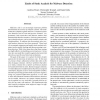16 search results - page 2 / 4 » On the Possibility of Provably Secure Obfuscating Programs |
IEEEARES
2010
IEEE
14 years 6 days ago
2010
IEEE
—Program obfuscation is often employed by malware in order to avoid detection by anti-virus software, but it has many other legitimate uses, such as copy protection, software lic...
ISW
2009
Springer
13 years 12 months ago
2009
Springer
Abstract. While code obfuscation attempts to hide certain characteristics of a program independently of an application, white-box cryptography (WBC) specifically focuses on softwa...
ACSAC
2007
IEEE
13 years 11 months ago
2007
IEEE
Malicious code is an increasingly important problem that threatens the security of computer systems. The traditional line of defense against malware is composed of malware detecto...
POPL
2010
ACM
14 years 2 months ago
2010
ACM
Software pipelining is a loop optimization that overlaps the execution of several iterations of a loop to expose more instruction-level parallelism. It can result in first-class p...
ACSAC
2006
IEEE
13 years 11 months ago
2006
IEEE
Security-typed languages are an evolving tool for implementing systems with provable security guarantees. However, to date, these tools have only been used to build simple “toy�...

